Business Minor
Advantages
Elevate your impact as a business-minded engineer with well-rounded business, accounting, and marketing skills.
Outcome
Engineering Consultant at Boeing

Pursue a biomedical engineering degree and take the inside track to a career that combines engineering and medical technology to find ways to improve the quality of human life.
Major & Minor
On Campus
As a biomedical engineering major, you'll combine engineering principles to problem solve within biology and medicine with the aim to help improve the quality of human life.
Behind many of the most groundbreaking advances in devices and equipment for improving human health is a biomedical engineer. Biomedical engineers play a critical role in the design of artificial organs, prostheses, instrumentation, medical information systems, health management and care delivery systems, medical devices used in various medical procedures, and imaging systems.
Widener's biomedical engineering degree is designed to offer both a core understanding of traditional engineering disciplines and an in-depth knowledge of the body. Our courses emphasize experimental and analytical coursework to gain a strong understanding of medical technology and complex living systems.

The biomedical engineering program is accredited by ABET. See recent enrollment and graduation data.
The curriculum at Widener encourages analytical thinking in a hands-on environment. You will share a common curriculum with all engineering majors with a focus on the fundamentals of mathematics, science, and engineering during your first and second years. You can pursue technical electives within biomedical engineering that include topics such as bioimaging, cell and tissue engineering, biosignal and biomedical devices, and rehabilitation engineering.
Program Details
Through your biomedical engineering courses, you will work with other health-care professionals in training while experiencing clinical immersion opportunities.
During senior year, you'll participate in a year-long project that simulates both the technical and business aspects of a professional engineering project, ranging from creative conception and design to prototyping and validation. Patenting is often a part of this process.
For educational objectives, student outcomes, and curriculum sequence, view our Loading....
College is about exploration. At Widener, you'll complete a general education curriculum that supports just that. You'll have the flexibility and freedom to dive deep into the topics that spark curiosity, challenge your mind, and power your personal and academic growth.
Along the way, you'll cultivate critical, meaningful skills employers seek, including:
It all starts with ASC 101: Thinking Through — a selection of around 40 course topics that will encourage you to go deeper and examine complex issues that shape our world and our ways of relating to one another. When you dive into the possibilities, you're sure to find multiple courses that inspire and intrigue you, regardless of whether they align with your major! Think of it as an opportunity to step outside of your comfort zone and truly learn something new. Then, in your senior year, you'll come full circle with a capstone course that takes your Thinking Through topic to new heights strengthened by everything you've cultivated along your college journey.
Earning an accelerated master's degree will enhance your job opportunities and prepare you for rapid career growth—all while saving you time and money.
As an engineering major, you have the unique opportunity to complete a bachelor's and master's degree in engineering in just 4 to 5 years through the Loading....
Accelerated 4+1 engineering students also have the option to apply for graduate-level scholarships and assistantships for their 5th year.
Widener also makes it possible to complete a 4+1 degree in a different field of study through our Accelerated Advantage 4+1 program. Master's degrees can be earned in allied health education (MEd), business administration (MBA), criminal justice (MCJ), organizational development and leadership (MA), and public administration (MPA).
As a biomedical engineering student, you can pursue a dual degree in another field of engineering. This enables you to earn a bachelor of science in biomedical engineering and another discipline within 4 years.
To learn more about dual degree options, contact the chairs of both departments to arrange your schedule accordingly.
Interested in medical school? Or any other health care professions, including osteopathic, dental, veterinary, or others? With careful planning, students can complete the requirements for the biomedical engineering degree and pre-med/pre-health professions.
Interested biomedical engineering students are advised to complete 2 additional biology courses (with laboratories), 2 organic chemistry courses (with laboratories), and 1 English course.
The biomedical engineering program coordinates with the Widener Health Professions Advisory Committee to see to your success in both programs.
Complete 8 months of professional work experience through the School of Engineering’s optional cooperative education (co-op) program and still graduate in 4 years. Many students choose to also pursue a 4-month internship, which gives them a year of work experience.
Our engineering co-op program allows you to launch your career 1 year earlier than students in typical 5-year co-op programs. This means you'll get a head start on your career—not only by earning an income as a co-op student, but also by earning a professional salary sooner compared to engineering students from other universities. You may also have the opportunity to receive full-time employment from your co-op or internship employers upon graduation.
How it Works
As a co-op student, you’ll spend the spring and summer semesters of your third year working in your industry—gaining 8 months of professional experience along the way.
Learn more about our co-op program and our Loading... for engineering students.
The engineering honors program is an exciting opportunity for academically talented students to enrich their engineering education with advanced honors courses, an honors seminar, collaboration with faculty on research, civic engagement, and professional and leadership development opportunities.
Students can complete their program of study in 4 years graduating with a certificate of honors in engineering.
Students must maintain a cumulative GPA and technical GPA of 3.00 or higher while enrolled in the Engineering Honors Program.
If you have questions, contact Dr. William Nagel (wsnagel@widener.edu) in the Engineering Honors Program.
Engineering students are a great fit for Widener's ROTC program. Here you'll strengthen critical-thinking, self-discipline, and team-building skills that can help you excel in a variety of engineering leadership and military careers.
ROTC cadets are eligible for generous scholarships—up to 100% full-tuition coverage—as well as the opportunity to join the Army as a commissioned officer after graduation.
Elevate your impact as a business-minded engineer with well-rounded business, accounting, and marketing skills.
Engineering Consultant at Boeing
Deepen your understanding of the global impact of engineering across cultures and graduate confident in your conversation skills.
International Project Manager
Hone your computational skills to show future employers exceptional problem-solving and creative thinking abilities.
Research Engineer at Johnson & Johnson
In advanced chemistry labs and courses like cellular and molecular biology, you’ll sharpen in-demand scientific skills.
Pharmaceutical Biochemist at Merck
Learn experimental and computational analysis techniques in state-of-the-art physics labs and graduate ready to innovate in medicine, technology, and more.
Medical Device Engineer
per year (2021 median salary for biomedical engineers)
Employment opportunities in biomedical engineering are expected to grow 10% by 2031, faster than the average for all occupations. Increasing technologies in medical devices, along with the medical needs of the aging population, will require the services of biomedical engineers.
Source: Bureau of Labor Statistics
Almost 30% of Widener sophomores and 50% of juniors pursue the co-op program. It's an invaluable learning experience that can help prepare you for your future career.
You have direct access to industry leaders, including many alumni of the program, though the School of Engineering Board of Advisors.
The biomedical engineering department has several constituents that serve to provide feedback for continuous improvements and program development.
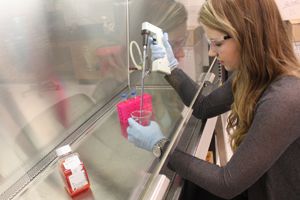
Shape the future of biomedical engineering and partner with award-winning faculty on innovative research including preventing birth-related injuries and creating mobile health tools. Undergraduate students work with the faculty on a wide variety of research topics. Their efforts have resulted in them presenting at conferences and being published in scientific journals.
As an engineering major, we know that laboratory experiences play a central role in your education. That's why we take great pride in making sure that our labs and facilities are as up-to-date as possible. Not only will you be absorbing knowledge in the classroom, but in the labs, you will be developing hands-on skills and bridging the gap between theory and practice.
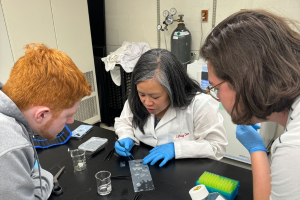
We want to get to know you and see you succeed. Professors will pay attention to how you learn and what you want to accomplish. Your Personal Student Success Team—faculty and peer mentors and liaisons for campus resources—will make sure your first year runs smoothly.
Without skipping a beat, you’ll have what you need to make Widener your second home. And you’ll know how to invest in the greater community, from professional opportunities in Philadelphia to volunteer experiences in your new backyard.
Lean more about faculty mentorship
Explore resources for academic & career support
Find support for health & wellbeing
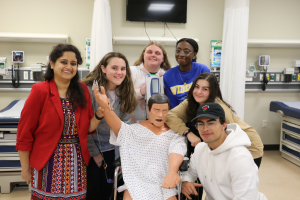
You can participate in a multidisciplinary biomedical device development course that includes a clinical immersion with nursing students. You will work together to identify unmet needs observed through clinical settings in places like Delaware Orthopedic Surgery, Scheie Eye Institute, and A.I. DuPont.
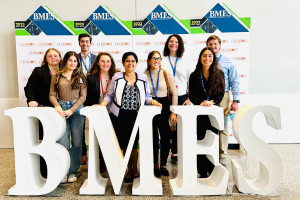
Ease your transition to college by joining your classmates in our engineering Living Learning Community (LLC). This unique opportunity familiarizes first-year students with engineering majors and faculty while addressing personal development, academic skills, and success in the engineering profession.
Biomedical engineering majors also have the opportunity to join various clubs and organizations across campus and beyond to expand their network, including the Tau Beta Pi - Engineering Honor Society, Biomedical Engineering Society (BMES), and many more.
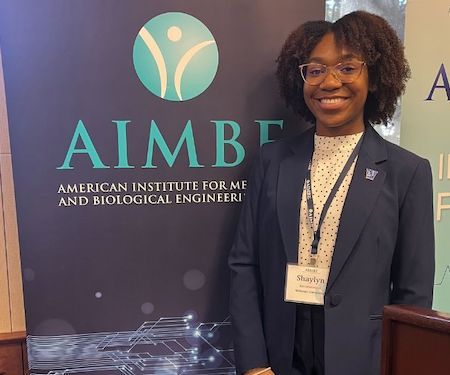
"I loved having the opportunity to do research, but also having the opportunity to research with a large medical device company—that’s something you don’t see quite often."
"Classes are small. So you can actually have that deep conversation with professors. It turns into an almost individual class and becomes better in the learning process."
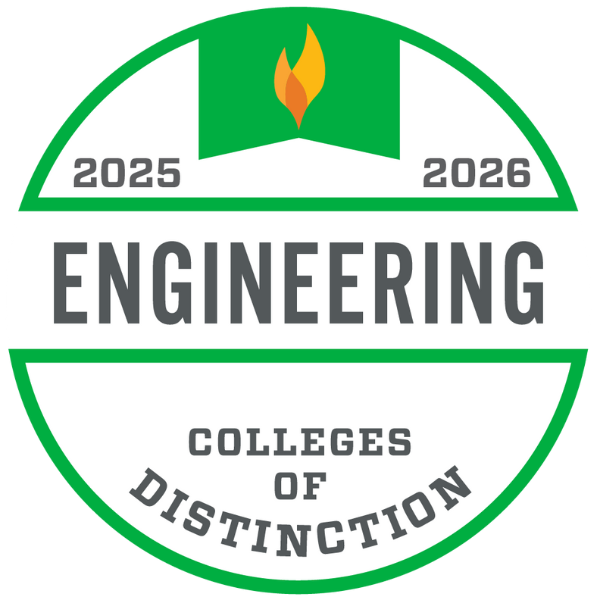
Recognized for top quality teaching and successful outcomes.
Gain up to 8 months of compensated work experience and still graduate within 4 years.
Industry leaders provide networking opportunities to students and support the school in its future growth and competitive development.
Generous graduate assistantships and scholarships for eligible students.
“At Widener Biomedical Engineering, my goal is not just to teach you facts and formulas, but to inspire you to design solutions that can save lives. As biomedical engineers you will be the ones transforming healthcare of our future!”
"I believe teaching without engaging the student imparts knowledge that does not last. Students should be able to apply the concepts learned in a course to real-life engineering problems. My research experience in a truly interdisciplinary field, which perfectly blends different branches of engineering (electrical, computer science, biomedical, mechanical) and medicine (radiology, anatomy, physiology), gives me the scope to share various real-life applications of engineering tools with students that imparts an understanding in them which goes beyond the boundaries of the classroom. This has prompted me to pursue research in engineering education."
I believe in the power of hands-on learning. Our BME program is designed to equip you with the skills to understand cutting-edge technology and apply it in ways that make a difference in people’s lives. At Widener, you'll be part of a close-knit community where your ideas are valued, and your growth is our priority.

Semaj Smith-Barber ’28, a construction management student, reflects on how volunteering—from his early experiences in Chester to Widener’s annual MLK Day of Service—shape his sense of belonging, career, and commitment to carrying forward the Rev. Martin Luther King Jr.’s vision of unity, equity, and compassion.

Here’s a look back at the moments in 2025 that made us cheer, crave boba and prove that at Widener, going big isn’t just a trend—it’s a tradition.
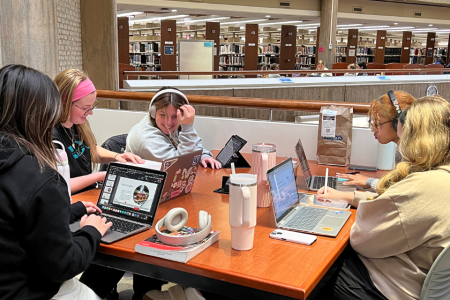
From events to help you de-stress, to tips for self-care, we’ve got your end-of-semester survival guide.
Our admissions and financial aid teams are here to support you every step of the way. Have a question? Ask away!
Applying to Widener is easy—and free! Simply complete our Widener Application or the Common Application. You'll also need your official high school transcript and either an admissions essay or your SAT/ACT scores. We're a test-optional school, so there's no need to submit both.
Know you're interested in applying to Widener but unsure if you're ready to zero-in on a major? You can apply as an Exploratory Studies student with an undecided major. This program will help you start your college journey on the right foot while you explore which undergraduate program is the right fit for you.
We accept applications on a rolling basis—there are no hard deadlines. Apply when you're ready and we'll take a look as soon as we receive your app.
Key dates to keep in mind:
Once we receive your application and all materials, you can expect to hear back from us quickly. Along with your application decision, you'll also find out about any merit-based scholarship awards. You're automatically considered for merit scholarships as soon as you apply—you don't need to apply separately.
If you apply before November 1, you are considered an Early Action applicant which comes with benefits like:
All applications are non-binding, so why wait? Apply today!
To transfer into an undergraduate engineering program, a minimum 2.5 GPA is required for consideration.
Additional Engineering Coursework Requirements:
Our admissions team will help you make the most of college-level credits earned after high school. We maintain strong partnerships and articulation agreements with numerous local community colleges and also accept a wide range of course credits earned at accredited colleges and universities.
Curious about how many credits may transfer? Email your transcripts to transfer@widener.edu and our transfer coordinator will personally review your coursework as an unofficial credit evaluation. Applicants are given priority during busy seasons, but you don't have to apply to work with our transfer coordinator.
Transferring doesn't have to be a guessing game—share your stats and we'll take it from there!
Widener University serves as a "second home" for students from around the world. We are located just outside of Philadelphia and close to New York City and Washington, D.C.—offering many unique professional and personal opportunities to explore.
Want to know what it's like to be an international student on campus or need assistance navigating English proficiency requirements? We're here to help, and our international admissions director will support you through the application process.
This support doesn't end with admissions—our International Student Support team will serve as a valuable resource throughout your Widener journey—meeting Visa/immigration requirements, getting acclimated to campus, and much more.
Learn more about applying as an international student
Learn more about life at Widener as an international student
Because Widener is a private institution, we're able to offer financial assistance that brings an exceptional education within reach. Complete your admissions application today to determine your financial aid package, including scholarships and grants.

Submitting the Free Application for Federal Student Aid (FAFSA) is the first step to getting you the financial assistance to make the cost of college—an investment in your future—affordable. This free, online application is the gateway to grants, loans, and other forms of financial aid. Every year, the U.S. Department of Education offers billions of dollars in financial aid to eligible students. Widener gets in on the action, too, annually awarding aid to students with need.
You and at least one parent or caregiver will need a separate FSA ID to access the Federal Student Aid's online system and serve as your legal signatures. Make sure to create your unique FSA IDs before you get started. Our school code is 003313.
Nearly 100% of new full-time undergraduate students receive significant financial aid offers that reduce out-of-pocket costs and make a Widener education not only affordable, but well worth the investment. In fact, once your total financial aid is calculated, the cost of a Widener education is often equal to if not lower than other competitive universities–but with far superior outcomes for your career and earning potential.
The first step to see how much aid you qualify for is submitting the FAFSA.
Funding you don't have to pay back after graduation? That's a win-win! Scholarships and grants are a way for the university and other organizations to honor the academic, merit, and talent-based achievements of our students.
In the Accelerated Advantage 4+1 program, you can save up to a year of tuition by pursuing a master's degree—resulting in thousands of dollars in savings. During your fifth year of study, you can also apply for graduate-level scholarships and assistantships to further reduce education costs. To learn more about graduate scholarships and assistantships, please speak with your academic advisor during the spring semester of your senior year.
Tap into our wide network of Philly-area employers and experience a full-time, paid co-op. In addition to earning an income, you do not pay tuition while on co-op. You can also choose to live on campus, at home, or even travel for your co-op.
Cadets in the ROTC program are given the opportunity to have a significant portion of their education paid for through scholarships—as high as 100% full-tuition coverage. If eligible, the scholarship program has numerous benefits for cadets including room and board, a monthly stipend, and more.
After graduation, cadets also have a direct pathway to a paid career with the option to advance into the military as a commissioned officer.
To visit Widener is to fall in love with the place. But don't take our word—experience it for yourself. Plan a visit to connect with our students, faculty, and staff.
We offer a variety of events to get to know Widener—from virtual sessions, workshops, and private tours, to the big splash of our signature open houses.
Have a question about Widener? Drop us a line and an admissions counselor will be in touch. We're always happy to help!
Applying online is easy—and it's free! We also accept the Common Application. Take the next step toward joining the Widener Pride.
Muller Hall
University Pl
Chester, PA 19013
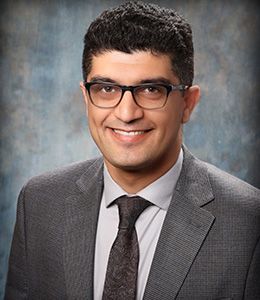
Kirkbride Hall
Room 269 A
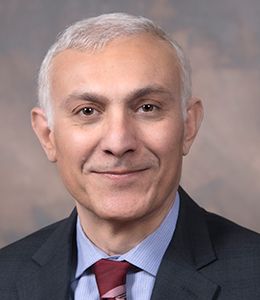
Kirkbride Hall
Room 107
